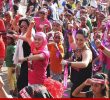The Talaingod schools set up by the local people’s organization of Ata-Manobo, Salugpungan Ta Tan u Igkanugon, represent a combination of adult and young literacy learning centre. In appreciating such initiative of the local community of lumads it is crucial to understand, what is the difference between schooling and education? Schooling for subordination is a conventional schooling that focuses on self-advancement within the feudal, colonial, and patriarchal structure. Education for empowerment is learning that inculcates critical thinking for collective action to end discrimination, domination and poverty.
For decades, lumad communities have dared to organize themselves as a people for a more solid action in empowering their communities through education. They started with non-formal education that caters to their ancestral domain and environmental concerns amidst issues of land grabbing and mining operations by multinational corporations and local cohorts. This type of education akin to Paulo Freire’s non-banking education trains them to be critical and analytical on their local issues, and themes generated from these learning exercises challenge them to go beyond the surface.
Community organizers among themselves demonstrated their organic intellectual capacity to deal with complex issues and exposed them to local elite discourse. Such process led them to mount advocacy-campaigns for a stronger position in constructing regular schools for even bolder move to an integrated basic education. Like their urban counterparts, these communities aspire for an improved living condition that propels them to seek for broad support.
Interestingly, they raise their consciousness, thereby becoming socially active. They lead themselves into workshops of increasing economic production. Integrating production in their learning process matters. Learning by doing is the call. Learning within the agricultural production thus, becomes easy with the adults and young people interacting. Production for community development like wise is important with a vision to contribute to advancing efforts of ancestral domain claim.
And why have they sustained their schools and continue their children’s education? Local partnership through the solidarity groups from the urban centres evidently is getting stronger that their initiatives attract both local and national organizations more than willing to advance the rights of the lumads, especially, education.
They fight for their right to education and development, no matter what! They venture into frontiers of learning inadmissible to others – who remain cold on their achievements.
For the lumads remain cool in their level of schooling as they continue to appreciate education that must be equally about process and quality, as it is about outputs and quantity. They, who have not been attended to by the state in their search for meaning in their lives, they who have not been reached by the Department of Education for decades, and now the government forces rob them of their initiatives and place them in a high risk situation – under a militarized command – where the local government unit is instructed to assume administration over these lumad schools with the local units of the Armed-Forces of the Philippines’ para-teachers- demolishing lumads’ collective gains!
The school project of the lumads stays with their political education at its height to surmount the domination and suppression. As they dare to struggle, they dare to win in this UN-backed enterprise!
Let us join them in their campaign, Defend Pantaron Range! Save our Schools!










